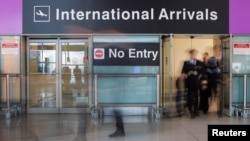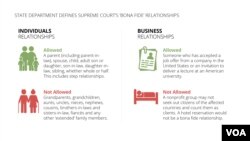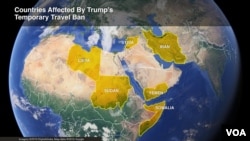The latest round of the U.S. travel ban rules seems to be moving forward Friday without the chaos and confusion that marked the first attempt. It comes days after the U.S. Supreme Court partially reinstated an executive order limiting travel by President Donald Trump that had been held up by lower courts on the grounds that it is unconstitutional.
The U.S. implemented new rules Thursday night requiring visa applicants from six majority-Muslim nations to have a close relationship with a family member or business in the U.S. in order to be eligible to be admitted into the country.
Senior administration officials earlier Thursday outlined how consular officials should proceed with the visa applications for people from Iran, Libya, Somalia, Sudan, Syria and Yemen.
The new rules took effect at 8 p.m. EDT (2000 UTC).
Anyone in transit to the U.S. with travel scheduled before July 6 will be allowed to enter. Those with travel booked after that date will be addressed "later," according to senior administration officials.
Previously scheduled visa application appointments will not be canceled, administration officials said, but all new applicants would have to prove their bona fide relationship to a family member or business in the U.S. in addition to passing traditional screening.
“We expect business as usual at ports of entry starting at 8 p.m.,” the officials said, anticipating a smooth rollout. Implementation of a first version of the travel order in January was met with protests at airports around the country.
A 120-day ban on refugees and yearly cap of 50,000 total refugees coming to the United States also went into effect Thursday evening; however, any refugee who can prove a relationship to a family member in the U.S. may be allowed entry.
However, shortly before the travel ban was to take effect, Hawaii filed an emergency motion in federal court, asking a judge to clarify that the ban can't be enforced against fiances or those relatives not mentioned in the administration's guidelines. The judge did not immediately rule on the motion.
Senior administration officials said 49,009 refugees had been admitted to the U.S. in fiscal 2017 as of Wednesday night, nearing the cap three-quarters of the way through the fiscal year, which begins in October. But the cap is likely to be exceeded as additional refugees are accepted on the basis of family ties. Officials said about half of refugees admitted to the U.S. have family members in the country.
Acceptable vs. unacceptable relationships
Acceptable close family relationships include a parent, spouse, child, adult son or daughter, son-in-law, daughter-in-law or sibling who is already in the United States.
Relationships that do not meet the requirement include grandparent, grandchild, aunt, uncle, niece, nephew, cousin, brother-in-law, sister-in-law, fiance or other extended family.
An acceptable business relationship has to be "formal, documented," and not created for the purpose of evading the travel ban. Something like a hotel reservation would not meet the requirement.
The guidance came days after the Supreme Court partially reinstated an executive order from President Donald Trump that limited travel, but that had been held up by lower courts on the ground that it was unconstitutional. The court will hold its own hearing on the legal challenges in October.
In their decision announced Monday, the justices said only visitors who can prove they have a "bona fide relationship" in the United States would be admitted, but did not give a definition of what an acceptable relationship was in terms of who should be exempt from the ban.
Lawyers ready to offer help at airports
Some U.S. immigration lawyers said many of their clients from the six affected countries were still filled with uncertainty. A number of attorneys planned to set themselves up at international airports, ready to offer help, as they did when the original executive order was put in place.
Trump says the order is necessary to protect national security, with the entry freezes meant to give the government time to strengthen vetting procedures.















